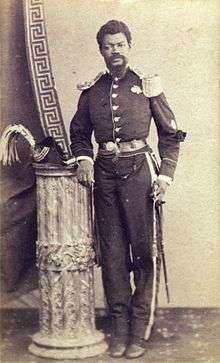Cândido da Fonseca Galvão

Cândido da Fonseca Galvão, also known as Dom Obá II D'África (Lençóis, 1845-1890), was a Brazilian military and nobleman. Son of freed Africans, and grandson of the Obá (king) Abiodun of the Oyo Empire, he was also known simply as Dom Obá.[1][2][3]
Galvão was born in Bahia near the town of Lençóis. He voluntarily enlisted in the all-black Zuavo company in May 1865 to fight in the Paraguayan War (1864-1870) and considered it his duty as a Brazilian citizen to fight for his country. Dom Obá continued to fight at the front until he was wounded in his right hand in 1866. His service during the war "inspired his commitment to ending slavery in Brazil and his pride in being a black man."[4] After the war, Galvão returned to Bahia, where he petitioned the government for recognition of his duty on the battlefield and for monetary compensation. Eventually, government officials relented and Galvão was awarded an honorary officership of the Brazilian Army for his accomplishments during the war. Galvão relocated to Rio de Janeiro in 1880, becoming famous in the carioca society. Due to his passionate activism against slavery and his peculiar wardrobe, Galvão was considered by Rio de Janeiro's wealthy as a "disturbed veteran" and "folkloric aberration." Dom Obá was a personal friend of Emperor D. Pedro II, and was revered as an African nobleman among the city's blacks and mulattoes.[5]
Dom Obá annually visited the Palace of São Cristóvão, where he was received as an African prince. Between 1882 and 1884, Galvão personally met with Pedro II 125 times to discuss the country's social and political issues including the abolition of slavery, and combating against racism. Due to financial support from Afro-Brazilian community, Galvão was able to voice his concerns in published articles in various newspapers. He was a large defender of the Brazilian monarchy.[6][7]
.jpg)
With the fall of the Brazilian Empire in 1889, Galvão was persecuted by the republicans, who annulled his military rank of alferes. He died soon after, in 1890. As Eduardo Silva writes: 'His death made the front pages of Rio's newspapers, and nearly every article about him emphasized the prince's "enormous tribe of followers" or "his immense popularity."'[8]
References
- ↑ Colin A. Palmer, Schomburg Center for Research in Black Culture (2006). Encyclopedia of African-American culture and history: the Black experience in the Americas, Volume 2. The University of Michigan, Macmillan Reference USA. p. 634. ISBN 9780028658186.
- ↑ Dale Torston Graden (2006). From Slavery to Freedom in Brazil: Bahia, 1835-1900, Dialogos Series, (Albuquerque, N.M.). University of New Mexico Press. p. 76. ISBN 9780826340511.
- ↑ Eduardo da Silva (1992). "Slaves, Freedmen and Free Men of Colour in the Transition from Slavery in Brazil, a Case Study: The Life, Times and Ideas of Dom Oba II D'Africa, Prince of the People, C.1845-1890". The University of London: 31.
- ↑ Mahony, Mary Ann (2009-02-01). "Dale Torston Graden, From Slavery to Freedom in Brazil: Bahia, 1835–1900 (Albuquerque, NM: University of New Mexico Press, 2006), pp. xxviii+297, $24.95, pb.". Journal of Latin American Studies. 41 (01): 77. doi:10.1017/S0022216X08005221. ISSN 1469-767X.
- ↑ Mahony, Mary Ann (2009-02-01). "Dale Torston Graden, From Slavery to Freedom in Brazil: Bahia, 1835–1900 (Albuquerque, NM: University of New Mexico Press, 2006), pp. xxviii+297, $24.95, pb.". Journal of Latin American Studies. 41 (01): 76–77. doi:10.1017/S0022216X08005221. ISSN 1469-767X.
- ↑ Mahony, Mary Ann (2009-02-01). "Dale Torston Graden, From Slavery to Freedom in Brazil: Bahia, 1835–1900 (Albuquerque, NM: University of New Mexico Press, 2006), pp. xxviii+297, $24.95, pb.". Journal of Latin American Studies. 41 (01): 77. doi:10.1017/S0022216X08005221. ISSN 1469-767X.
- ↑ "A black prince in the streets of Rio de Janeiro - Obá 2º, friend of Pedro 2º, attacked racism and defended equality" (in Portuguese).
- ↑ Lovejoy, Paul E. (2009). Identity in the Shadow of Slavery. New York: Bloomsbury Academic; Second Edition edition. p. 132.
Sources
- Silva, Eduardo. "O Dom Obá II D'África Príncipe do Povo - Vida, tempo e pensamento de um homem livre de cor" Companhia das Letras, 1997. ISBN 9788571647268
- Souza, Marina de Mello. "Reis negros no Brasil escravista: história da festa de coroação de rei congo." Ed. UFMG, 2001. ISBN 8570412746
External links
- http://antigo.acordacultura.org.br/herois/heroi/domoba
- http://naijatreks.com/2011/11/nt-candido-fonseca/